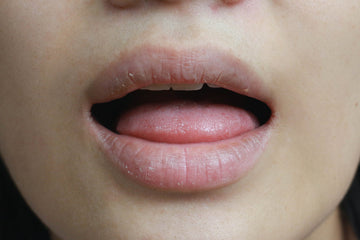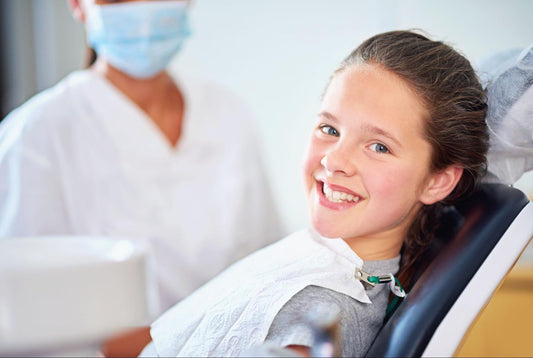Bad Breath in Kids? The Common Causes and Cures

Bad breath in children, also known as halitosis, can be worrying for parents, but it’s usually nothing to panic about.
While it’s often caused by simple things like poor oral hygiene or certain foods, persistent bad breath could point to an underlying issue that needs attention.
In this guide, Dr Ana Roberts B breaks down the most common causes of bad breath in kids, when it might signal something more serious, and the best ways to tackle it so your child can enjoy a healthy, fresh mouth.
What causes bad breath in kids?
Bad breath in children is quite common and usually nothing serious, but it can sometimes be a sign that their mouth needs extra attention. Understanding the cause is the first step in tackling it.
Here are some of the common reasons why your child may be suffering from bad breath.
1. Poor oral hygiene
If children don’t brush and floss properly, food particles can get stuck between their teeth or build up on the tongue. Why does that matter? Bacteria break these down and produce nasty by-products – usually in the form of smelly gases – that lead to bad breath. Plaque build-up can also contribute to gum problems, which can add to the odour.
2. Dry mouth
Saliva helps clean the mouth and wash away food and bacteria.
If a child breathes through their mouth — often at night — or doesn’t drink enough water, their mouth can dry out. A dry mouth gives bacteria the perfect environment to thrive, causing bad breath.
3. Diet
Certain foods can temporarily cause bad breath in children, just like in adults. Strong flavours and too much processed food can leave lingering, unpleasant smells in the mouth. Sugary snacks can also fuel bacterial growth, exacerbating bad breath in kids.
4. Dental problems
Although unlikely in younger children, it’s always possible that cavities, gum disease, or infections inside the mouth could be the cause of persistent bad breath.
Decay and infection produce odour as bacteria break down tissue, so it’s important to check for these causes, as brushing alone doesn’t help the problem.
5. Tonsil stones
Sometimes, food and debris get caught in the tonsils and harden into small white stones.
These can smell very unpleasant and may cause bad breath even if a child has excellent oral hygiene.
6. Illnesses or medical conditions
Respiratory infections, sinus infections, or conditions like acid reflux can contribute to bad breath in children. Mucus from the nose or throat and acid from the stomach can add to odour problems.
How to treat bad breath in kids
If your child is suffering from persistent bad breath, it’s important not to panic.
The good news is that, in most cases, bad breath in children can be treated at home with simple steps. The key is building a consistent and thorough oral care routine.
Here are some of the steps that you can take to improve your child’s oral health and freshen their breath.
1. Encourage good brushing and flossing habits
Make sure your child brushes their teeth twice a day with fluoride toothpaste and flosses daily. Don’t forget to clean the tongue — a common hiding place for bacteria that cause bad breath.
If you want to learn more about how to maintain a good oral routine, read our guide.
2. Keep your child well hydrated
Water helps wash away food debris and keeps saliva flowing. Encourage your child to sip water regularly, especially if they’re prone to mouth breathing or have been feeling unwell.
3. Choose the right snacks
Crunchy fruits and vegetables like apples and carrots can help naturally clean teeth. Limiting sugary foods and sugary drinks helps to limit bad breath and prevent issues associated with a high sugar intake, like cavities and gum disease.
4. Consider alcohol-free mouthwash
A gentle, alcohol-free mouthwash can help freshen breath as part of a good oral hygiene routine. It’s not a cure, but it can offer temporary freshness, and more prolonged freshness if used regularly.
5. Visit the dentist for regular check-ups
Routine dental visits will help spot any cavities or gum problems early, before they lead to ongoing bad breath.
As well as your GP, your dentist can also run tests for other issues and underlying conditions which may be causing bad breath, letting you get your child the right treatment.

When to see a dentist or doctor
While most cases of bad breath in children are harmless and can be easily managed at home, there are times when it’s best to seek professional advice.
You should contact your GP or doctor if your child:
1. Has persistent bad breath despite good oral care
If your child’s bad breath continues even though they brush, floss, and drink plenty of water, it could point to dental problems, tonsil stones, or another underlying issue that needs checking.
2. Shows signs of tooth decay, gum disease, or mouth pain
If you notice holes in teeth, red or swollen gums, bleeding during brushing, or if your child complains of mouth pain, book a dental appointment. These are signs of issues that could cause bad breath and other problems, if not treated quickly.
3. Exhibits any other concerning symptoms
If your child’s bad breath comes with fever, swollen lymph nodes, persistent sore throat, or difficulty swallowing, see your GP. These could be signs of an infection or another medical condition needing treatment.
FAQs
1. Can brushing and flossing cure bad breath in children?
In most cases, they can.
Brushing and flossing remove the food particles and plaque that cause bad breath. Don’t forget to clean the tongue too, as bacteria can build up there.
2. Can mouthwash cure halitosis in kids?
Mouthwash may help mask bad breath temporarily, but it won’t cure it.
It’s best used as part of a good oral hygiene routine. Just make sure to use alcohol-free mouthwashes as these are much gentler for children’s mouths.
3. What if my child has bad breath even after brushing?
If your child’s breath smells despite good brushing and flossing, there could be another cause, like tonsil stones, a sinus infection, or reflux.
If this is the case, it’s worth booking an appointment with a dentist or GP to rule out any more serious conditions.




